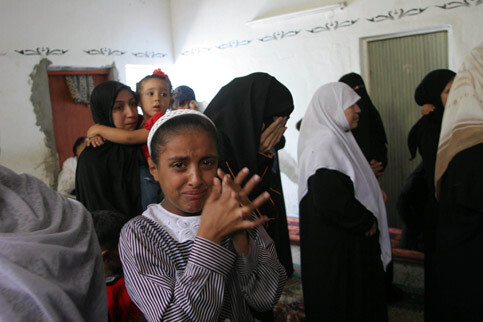IRIN 28 September 2006

Palestinian relatives take part in a funeral as they mourn Azah Hamas, 14, in Rafah refugee camp, southern Gaza Strip, 27 September 2006. (MaanImages/Hatem Omar)
GAZA CITY - A survey by a West Bank research company has revealed that the level of “severe depression” in the population of the Palestinian territory had increased by 21 percent over the past year to 77 percent.
The survey, conducted by Near East Consulting company, questioned residents of Gaza, the West Bank and East Jerusalem on their general state of being. Much higher levels of depression were found in respondents living in extreme poverty, where the figure stands at 83 percent.
With an international trade embargo on the occupied Palestinian territories (oPt) in place since Hamas - considered a terrorist organisation by the United States, the European Union and Israel - won democratic elections in January, the Palestinian Authority has been unable to pay salaries to 165,000 civil servants. Many families rely on loans from family and friends to purchase basic food items.
In Gaza, civil servants have accumulated an average personal bank debt of US $2,000, according to the Portland Trust, a UK-based business development foundation.
Only 13 percent of respondents in the oPt said they were “very content”, a decline of 12 percent from 2005.
Of the 827 Gazans undergoing counselling for psychological stress suffered over the past few months due to the conflict, 342 are younger than 16, according to Dr Mouaweia Hassanein of the Palestinian Authority’s health ministry.
“They are suffering symptoms such as uncontrolled urination, irritability, depression and insomnia,” he said, adding that 72 pregnant women in the sample survey had miscarried after witnessing Israeli military action.
Dr Adel Oda, assistant director of the Gaza Psychiatric Hospital, said deteriorating living conditions in Gaza meant residents suffered extremely high stress levels.
“The terrible economic situation is stressful. You also have a feeling of confinement in Gaza because you can’t get out - the border with Egypt is rarely open and all the others are closed. You hear the Israeli aircraft in the sky. You feel anger,” Oda said.
“Where does that anger go? To your muscles, heart, stomach and brain. Parents and children are always fighting each other,” he added.
Oda said that for many, trauma manifests itself physically.
“The heart rates go up; they suffer stomach pain and rigid joints. I have seen some simply fall down and become unable to get up when they hear another bomb. Some have convergent hysteria - they suffer temporary blindness or cannot speak.”
He said many residents were ashamed to seek professional help for their stress but instead visited Muslim sheikhs or relied on family.
Oda said he used relaxation techniques to try to calm traumatised people and said group therapy was also a good way to get support from others who have been through similar experiences.
Dr Hazem Aboud of the Berlin Pharmacy International in Gaza City said demand for sleeping pills and ear plugs had gone up by 50 percent as Gazans attempted to live with constant Israeli military activity.
“It’s pills for the adults and ear plugs for kids - the people are trying to deal with the sound of tank and aerial bombardment,” he said.
Shlomo Dror, spokesman for Israel’s Government Coordination Office, which monitors the humanitarian situation in the West Bank and Gaza Strip, said Israel was aware that the situation in Gaza was bad, but said there would be no Israeli military action in Gaza if Palestinians stopped attacking Israel.
“We left the Gaza Strip and we were hoping for a new time when we could all move on. The moment the Hamas government recognises Israel’s right to exist and they stop the terror attacks, then we will be able to sit down and talk,” he said.
This item comes to you via IRIN, a UN humanitarian news and information service, but may not necessarily reflect the views of the United Nations or its agencies. All IRIN material may be reposted or reprinted free-of-charge; refer to the copyright page for conditions of use. IRIN is a project of the UN Office for the Coordination of Humanitarian Affairs.
Related Links